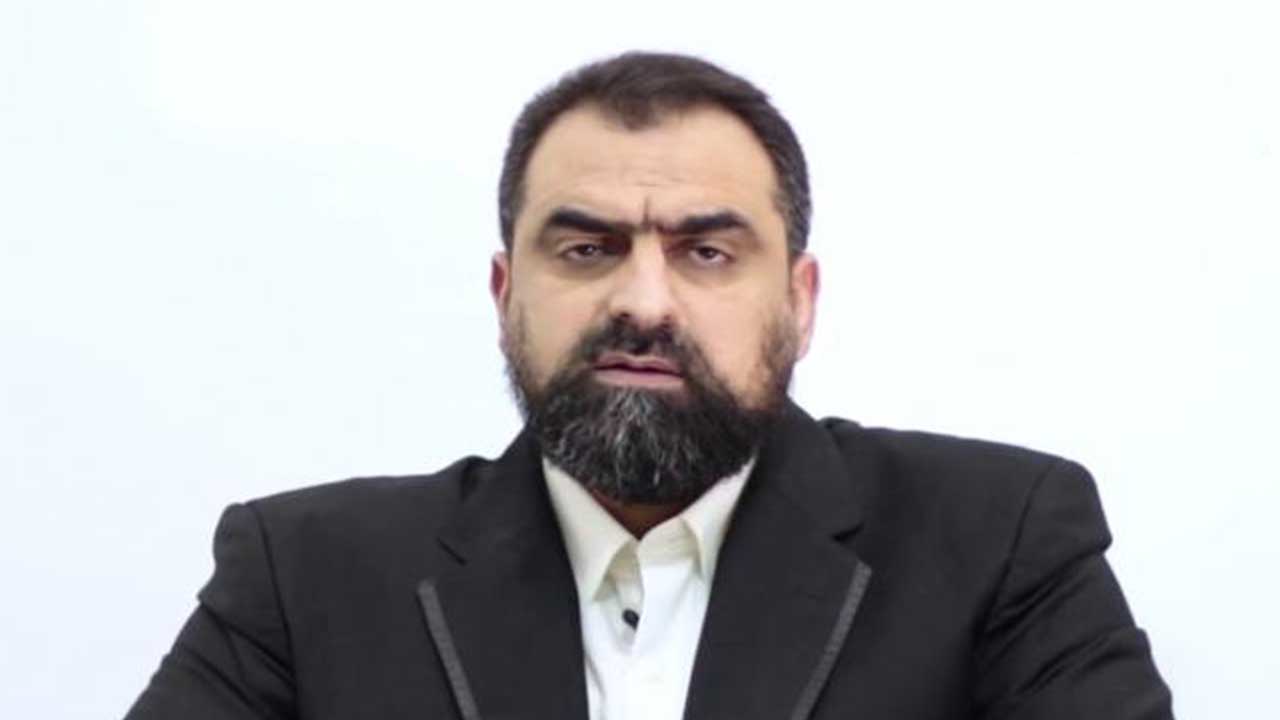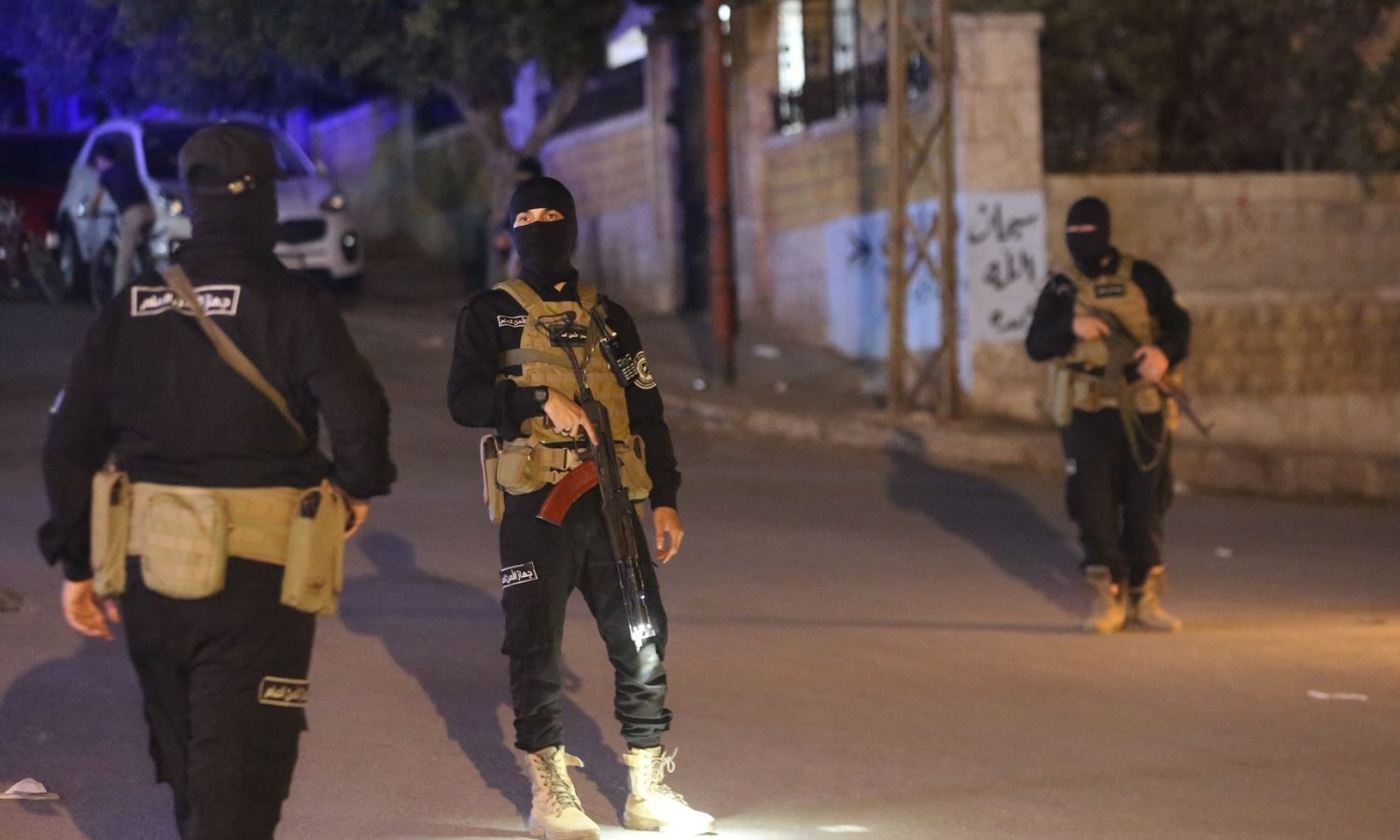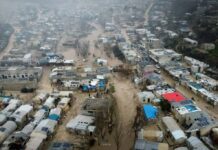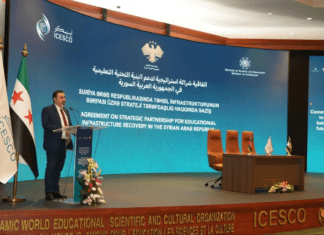
By: Hassan Soufan
Translation: L24
Hassan Soufan has played a significant role in the Syrian Revolution. With a background in Islamic studies and activism he was held in Sednaya Prison and freed in a prisoner swap in late 2016, Soufan swiftly ascended to leadership roles within revolutionary factions, notably Ahrar al-Sham, where he aimed to revitalize the organization.
He became known for his moderate stance amidst the conflict’s tumultuous landscape. Despite confrontations, both ideological and militarily, with Hayah Tahrir al-Sham (HTS), he advocated dialogue and reconciliation. Soufan was a leader of Ahrar al-Sham and later general commander of the Syrian Liberation Front.
Soufan resigned from his positions in 2018 and 2019, citing personal reasons, yet did not diminish his dedication to the Syrian revolution. Amidst Syria’s complex political landscape, Soufan’s history provides him with a wealth of experience and perspective which has led him to continue to write and comment on the developments in the Syrian arena despite his absence from leadership. Soufan has recently published an analysis on current events in liberated northern Syria which has been translated and published by Levant 24 to provide a broader context on current politics, realities, and developments of the Syrian revolution as it celebrates its 13th anniversary.
______________________________
Praise be to Allah, and blessings and peace be upon our Master Muhammad and his family and companions altogether:
I congratulate our heroic mujahideen and all our honorable people in the liberated areas on the advent of the month of obedience and forgiveness, which coincides with the thirteenth anniversary of the launch of our blessed orphaned revolution. We ask Allah to grant us success in fasting its days and praying its nights with faith and seeking reward, and to grant us victory over the Assad regime, the Iranian mullahs, and the occupying Russians, and to decree success for our revolution in its objectives. We also ask Him to aid our mujahideen brothers and our patient people in Gaza, and to relieve them with swift victory and imminent liberation, for He is capable of all things.
Our dear brothers, we have been living for some time in our liberated areas dealing with the pressing issue of the “espionage case” and the resulting arrests. Some have been unjustly incarcerated only to later be found innocent of the charges against them, and the leadership of Hayah Tahrir al-Sham (HTS) bears responsibility for this openly, along with the repercussions and consequences on the security, military, and popular levels within the liberated areas.

I am not inclined to record positions, for the situation is more significant than that, and I am not in the context of justifying anyone, as what has occurred requires more than just patching up. I am known, by my previous actions, for confronting and challenging what I believe to be wrong, and it is not in my nature to abandon ship, as some may imagine. Thus, assuming responsibility and adopting a comprehensive perspective leaves us no choice. We pause to reflect on what has happened, seeking truth and righteousness, with advice and clarification for all:
Firstly: The complete responsibility for what has transpired lies with HTS, as it is the entity that spearheaded and shouldered the burdens of governance. The current dysfunction can be attributed to two main factors: firstly, it is related to being a nascent governing system within a fragmented social and factional reality, with many cadres and talents opting not to engage in the work due to the absence of prior practical experience in governance. Loyalty has been prioritized over competence in some appointments, while in others, reliance has been placed on what is available within the equation of trust and eligibility, alongside weak mechanisms of oversight and accountability.
Secondly, there is the issue of the recent “espionage case,” which has raised questions about the credibility of the General Security Services (GSS), the number of former detainees, the dismissal of charges against them, and the internal regulations governing the apparatus. We have all felt distress and remorse upon learning about these transgressions and injustices, and we seek refuge in Allah from what does not please Him.
Secondly: Since HTS bears full responsibility for what has transpired, we believe it is the entity responsible for addressing it through a comprehensive reform process guided by clear and reassuring mechanisms that dispel concerns about evasion and neglect of reform demands. Anything less than that will not address the damage to credibility and erosion of trust caused by the crisis. Recent events have revealed that HTS, as a group, is an integral part of society, responsive to its aspirations and sharing its concerns. This also makes it the primary gateway for reform, which cannot be achieved by antagonizing it or bypassing it.
Thirdly: Accusations of treachery are utterly rejected, whether directed at HTS, as in the case of the espionage case, or from its adversaries who hurl accusations of treachery, a vile tactic employed by Daesh (ISIS) and many others, politically, in the media, and even on the ground, whether intentionally or unintentionally. The misuse of this accusation is repulsive and places those who use it in the category of perpetual enmity or inconsistency in positions.

It pleases the enemy, saddens the friend, confuses the people, and undermines sympathy for our just causes. Much of the animosity stems from human endeavor at times or personal and vested interests at other times. Hastening to label others as traitors without evidence or proof is a grave error and blatant injustice. I believe that no rational person rejoices in the arrests related to the security file when accusations are circulating, nor is a person of faith saddened by the exoneration of the accused, and one wishes that if the accusations were true, the believers would think well of themselves.
Fourthly: With the agreement on the presence of many sincere individuals in the current movement who strive to end injustice and correct matters, if we look at those who currently engage in provocation and incitement, we will find among them some who have previously indulged in this corrupt hobby in other areas. Which ultimately led to the loss of those regions and their transfer into the hands of the enemy, the Assad regime.
Others among the instigators have a track record marked by dismal failure, as they have only led their groups to loss, disintegration, and ultimately ended up as mere spectators. Their main activity is wishing for the downfall of their opponents and inciting against them internally and externally. Can individuals like these be suitable companions for the path of a revolution of change? Can the fate of the entire liberation movement be entrusted to such individuals, who are divided and lack the slightest prerequisites for success, vision, or sound planning, and are only united by their enmity towards HTS and their hostility towards it?
Most of the wise individuals within HTS, despite some of them opposing it, realize that many of its opponents are not suitable alternatives to it. Thus, most of them opt to distance themselves from any chaotic movement not guided by religious necessities or the higher interests of Muslims.
Fifthly: There is no doubt that the reform demands raised in the protests are legitimate and justified. However, some use an inflammatory discourse characterized by personalizing (making one individual the locus or source of blame or fault) and deviation from objectivity.
This odious rhetoric has convinced all members of HTS, its soldiers, its cadre, and even its allies that they are targeted by this movement (protest movement). This has stirred their resentment and contributed to creating a negative polarization that the enemy may exploit to sow discord and harm people. Despite a previous legacy of overcoming factions and generating many opponents, whether justifiably or not, HTS – as a former faction and also as a current authority – has its strongholds and influence deep within society, whether we like it or not.
Those harmed by HTS have the right to complain – Allah does not like the public mention of evil except by one who has been wronged. However, they do not have the right to expose the entire organization to risk and open the gates to the enemy to harm Muslims.
Sixth: What has been announced as reform decisions, in our opinion, is suitable as a starting point and foundation for further steps to complete the required reforms. Regardless of the risk involved in accepting this with the insistence of elites and influencers in society to achieve it, it is certainly less risky than risking the entire organization and engaging it in futile battles. Which would no bet in favor of our people, who have no safe haven other than this region. We say to the leadership of HTS that openness to everyone in our society, which is rich with the best of the revolution’s elites and its experienced specialists, is necessary. Managing HTS is heavy on the entire revolution’s components, let alone shouldering it from one group.
Efforts must also be made to institutionalize public decision-making so that participation in accessing information and formulating public policies is ensured. This is crucial for preserving achievements, accumulating experiences, strengthening construction, maturing, and sustaining it to achieve our desired goal of overthrowing the Assad regime.

It is essential to note that despite recent events, we cannot ignore the qualitative leap that has occurred in building institutions and organizing society within HTS in a short period and with limited resources despite major challenges. Therefore, it should be considered a strategic achievement for all the revolution’s children that requires preserving, nurturing, and developing it, as it is the harvest of our people’s sacrifices.
Seventh: Those who exert themselves in external incitement against HTS overlook the fact that they inadvertently execute the enemy’s agendas. The ramifications of the battle of Gaza have just begun and will not end soon. Instead, they have unleashed a series of consequences that will directly affect the liberated areas.
Whether or not we agree on whether what happened with HTS is an external conspiracy and a “soft war” to remove this component, or a result of internal, legitimate, and universal factors, we will certainly not disagree that the Assad, Iranian, and Russian enemies will not miss the opportunity to exploit any disturbance in the liberated areas to weaken the revolution and perhaps end it.
Also, those who seek to sow discord between HTS and the Turkish ally overlook the fact that they are also executing the agendas of Turkey’s enemies who want the regions adjacent to Turkey to be rife with disturbances and chaos because that threatens Turkish national security and muddles all the cards on the table.
Eighth: The Islamic Movement of Ahrar al-Sham has previously engaged in internal conflict repeatedly, and considering the harm it caused to the liberated areas and the depletion of the revolution’s resources, its soldiers, and its weapons, the movement has decided to cooperate militarily on the liberated fronts with all factions, most notably HTS, and to leave the fields of conflict and negative competition. This choice has contributed to a relative stability that has led to the activation of a viable governance system in the liberated areas, which we hope will evolve and mature over time to represent our aspirations for a just rule that establishes justice, eliminates oppression, and achieves the goals of our revolution.
We are not inclined to return to square one due to the significant risks of failure and enemy domination. We call on all our brothers to raise awareness of the impending dangers because the difficulties and challenges in establishing a new governance system from scratch have a high cost on the liberated areas thirteen years after the start of the revolution, especially with the enemies lying in wait with the capabilities of states. Moreover, opposition factions only unite in their opposition to HTS. Therefore, we believe that the cost of reforming the current system is much easier than risking unknown dangers that may outweigh its benefits, and Allah knows best.

Finally, we say: The mission of the preachers, reformers, and people of principles is to create an arc of salvation, not to jump from it to the waves of whims, desires, whims, and self-interests. We hope that both HTS and those who oppose it will seek what is pleasing to Allah with us and act accordingly.
For there are suffering people on our shoulders, and a nation that has made many sacrifices deserves much better than what we are doing now. If someone asks me, “What do you wish for? What do you pray for?” I say, “I wish for HTS to rectify itself by itself and to seek help from every qualified and trustworthy individual in this society so that it can fulfill its duties and responsibilities.”
What has befallen us is due to sins and injustices that require us to repent and seek forgiveness. Calamity does not descend except because of sin, and it does not rise except by repentance. “I pray to Allah Almighty to guide them to that, for it is better for them and better for the liberated areas and its people.” I say this statement, seeking forgiveness from Allah, and may the peace and blessings of Allah be upon our Master Muhammad, his family, and all his companions. Our final prayer is that all praise is due to Allah, the Lord of all the worlds.








